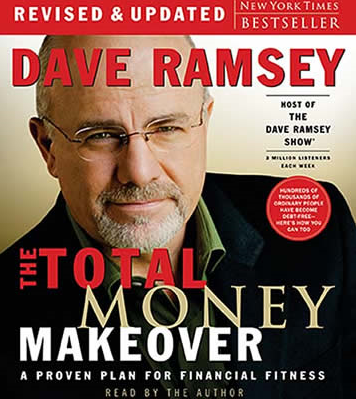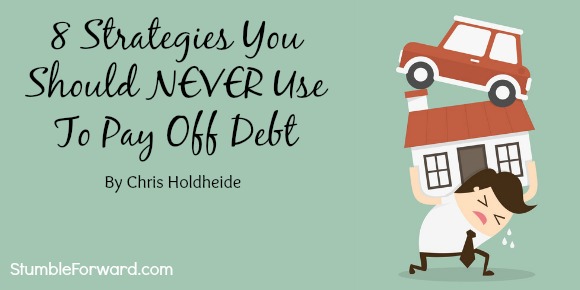The Dave Ramsey Baby Steps Review
 Are you in debt up to your eyeballs? In this article, I’m not going to be talking about some new fly by night get out of debt strategy but rather a proven system by one of the most revered men on the subject of teaching others how to get out of debt.
Are you in debt up to your eyeballs? In this article, I’m not going to be talking about some new fly by night get out of debt strategy but rather a proven system by one of the most revered men on the subject of teaching others how to get out of debt.
In this article, I am going to be reviewing the Dave Ramsey Baby Steps Plan with a fine tooth comb and giving you all the good and bad things about his makeover plan.
The Dave Ramsey Baby Steps Plan
Dave Ramsey’s plan is unlike any other get out of debt plan I’ve ever come across. In fact, the Dave Ramsey Baby Steps Plan is more than just a plan to get out of debt it’s a way of life.
Dave Ramsey’s baby steps plan, also known as The Total Money Makeover, is made up of seven major steps which are designed to help you focus on specific areas of your finances. They were designed to be followed on chronological order from beginning to end, they are as follows.
Step 1: Save $1000 Fast
The first step in this plan is to save $1000 as fast as you can. You might be thinking why should I save money when I have a debt to pay off? The reasoning behind this is so you have that cushion between you and falling into any more financial traps.
Things like unexpected car repairs, medical bills, and anything else you can think of will take a huge toll on your finances. So the first thing you need to do is save some cash fast.
If are wondering how you might come up with this extra money take a look at this article to get a few ideas for what you should do.
Step 2: Pay Off All Debt Using The Debt Snowball Plan
This step is where you put together what is called a debt snowball plan and start paying down debt rapidly. If you’re not sure how to put this type of plan together you can learn more about it here.
In this step, you will also pay off all of your debt except your mortgage. Why is this? Mostly because this debt takes the longest to pay off and also has some extra added tax benefits which will help lower your tax burden.
Step 3: Build 3 To 6 Months Of Expenses In Savings
Now that we have our debt paid off we want to continue building that emergency fund that we started in step one. At this point, we should have a budget together and know how much we are spending on everything we buy.
We should know how much we are spending and where it is going. So figure out how much your expenses are for the month and times it by 6 and this will be what you need for a six-month emergency fund. If that number looks too big to you cut it in half and start with a 3-month emergency fund.
Step 4: Invest 15% Of Your Household Income For Retirement
At this point, you should have the ball rolling. In this step, we want to maximize our retirement saving by setting aside at least 15% of your household income into some type of long term investment such as a mutual fund or 401k.
For example, let’s say at your job you are contributing 3% of your paycheck to your 401k and they’re matching it 100%. This means that you are contributing 6% to your retirement fund. If your spouse is doing the same then you are saving 12% and only need to save 3% more.
Step 5: College Funding For Children
In step 5 of the Dave Ramsey Baby Step Plan, you want to focus on saving some money for your kid’s college education, but only after you’ve paid yourself first. Sometimes as parents we tend to give everything to our kids first. College funding is important but make sure you are on track first before you decide to help someone else out.
If you’re wondering where to find a good college check out Peterson’s. On this website, you will be able to find information about any college around the country from the cost of tuition, rates on room and board, to the type of degree programs they have.
Step 6: Pay Off Your House Early
In this step once we have taken care of the savings aspect so we can now turn our attention to paying off the biggest debt of all, your mortgage. In this step, Dave recommends that you don’t use any more than 25% of your income for mortgage payments. He also says that you shouldn’t have a mortgage with a term any longer than 15 years.
He says mortgages at 15 years have lower interest rates and in the long run, you’ll pay less interest as a result.
Step 7: Build Wealth And Give
You did it! At this point, you’ve paid off all of your debt and should be on track to build great wealth for you and your family to come. In fact, you will be on track to change future generations for years to come all because you followed this plan.
Now that you have your debt paid this gives you a great opportunity to give back to others. This can be anything from donating to a charity, to giving to your church, or even as simple as making a mortgage payment for someone who is having a tough time paying their bills.
What I Like About Dave’s Plan
- First off, Dave Ramsey’s plan offers a place to start from with a step by step approach. One of the biggest problems people face is that they get too overwhelmed by all the bills they have. It feels as if you’re going to be in debt forever.
- Second, this plan forces you to focus on one particular area of your finance’s at a time. Instead of looking at everything as a whole Dave’s plan breaks everything down for you into simple bite-size pieces.
- Finally, this is not just a plan to get out of debt it’s a way of life. The Dave Ramsey Baby Steps Plan is a total money makeover from start to finish. It not only helps you pay off all of your debt but also helps you save more money than you could ever imagine.
What I Didn’t Like About The Baby Steps Plan
With all the things I love about this plan there are just a few things I don’t like about this plan. So to keep things fair and balanced I am going to give you a few things that bother me about this plan.
In Dave Ramsey’s book, he mentions you should get rid of all of your credit cards and only use a debit card. It’s hard to agree with this, in fact, he claims that rewards cards are not worth it and you hardly ever get the rewards from them. I have a Marathon MasterCard and have been getting a 5% rebate on all of the gas I bought from day 1.
Dave also claims that people who have credit cards spend 30% more than if they would have just used debit or cash. I can agree with Dave to an extent but the same can hold true with a debit card. If you can have access to your money 24/7 what stopping you from going to the nearest ATM and withdrawing an extra $20.
Second, I don’t agree with Dave’s Plan on the fact you should only ever own term insurance because everything else is too expensive. In fact, in his book, The Total Money Makeover, Dave says you can buy a term policy for as little as $7 a month.
This might be true if your 20 years old and have no health issues, but if your 60 years old and coming off of a 30-year term policy and you didn’t save any money, or blew it all, a 30-year term policy will cost you dearly. I’m not going to go into this in great detail now but just know that a term policy isn’t right for everyone.
Finally, Dave’s Plan says you should save for your child college education in either an ESA (Education Savings Account) or a 529 college savings plan. The thing I don’t like about these plans is what if my child doesn’t go to college; can I still give them the money?
The answer is yes but at a price, you will have to pay taxes on all of the money you saved or you can give it to another child that is going to college.
Furthermore, do you really want to pay for all of your child’s education? I can tell you that my parents had no plan in mind to even help me pay for my college education. Not because they might have been poor but because they wanted me to learn how to work for what I wanted in life and not to be given everything at the drop of hat.
Sure, I’ll give my child some money to get started but am I going to pay for their entire college education?
Nope.
Who Is This Plan Meant For
The Total Money Makeover is a proven plan for financial fitness, but this plan isn’t for everyone. If you’re someone who has no debt and saving a good chunk of your money this plan isn’t for you. So who is this plan for?
Obviously, if you’re someone with any amount of debt at all could benefit greatly from this program. You don’t necessarily have to have a lot of debt to be in this program. In my case, I only have $4600 of debt not counting my mortgage.
If you’re someone who can’t handle money well this program is meant for you. If you’re the type of person that spends money without reasoning or thought of what you’re doing this program can help you.
If your someone who wants to do more with their life than worry about living day to day paying your bills. The Dave Ramsey Baby Steps Plan can help you.
Call To Action
Well, are you going to do it? Are you going to let another day much less a second go by living life the way you are? What I’m saying is you have complete power to change your situation right now or just throw up your hands to the mess and do nothing.
There is a saying that Dave mentions in his book, The Total Money Makeover, and that is,” If you will live like no one else, later you can live like no one else.” That means if you stop right now and focus all of your attention to this plan someday you could be living the life like no one else. It may not happen today or tomorrow but it will happen. The Dave Ramsey Baby Steps Plan can give you the freedom you’re looking for.





Hey Chris,
Great review of Dave Ramsey’s latest book — I agree with pretty much all of your points, especially the one you make about the credit cards. If you cannot use them wisely, then yes, maybe it is best not to have them at this time. But, if you do know how to use them and can do so wisely, you can get great benefit from it. I have a Capital One cash back rewards, and it has really come in handy when I’ve accumulated enough.
I feel that I do a pretty good job of handling my finances, but I do have a great deal of student debt that I’m looking to eliminate. Judging from your review, it may be worth my picking up this book (or at least looking for it in my library!).
Thanks again,
Chris
Christopher,
First, thanks for the comment. I alway appericate some great feedback.
Second, I got the book a little over a month ago and could put it down at all. It was a great read. Now that I’ve read the book I’ve jumped into the baby steps plan and I’m now on step 2 of Dave’s plan paying off my debt. I currently have around $4600 of debt which I hope to have paid off in the next six months.
How to hear more from you.
Chris
I have heard of Dave Ramsey, but have never had the chance to read his book. Your review was great and made we want to check it out. Maybe he could help me get out of debt? Who knows…
Thanks!
Netanya
Money Hackers Blog Ambassador
Netanya, I’m glad you liked the review. The book has had a profound effect on me getting out of debt. I strongly recommend the book for anyone who wants to kick debt once and for all.
Term life insurance is almost always the way to go. To your point about the 60yr old who needs to by insurance, I would just say that if you follow Dave’s advice by the time you are 60 you will not need insurance (well off w/ no debts).
Hi Christopher, Thanks for the review.
There is a problem with your math in Step 4. If I save $6 of every $100 I earn and my spouse saves $6 of every $100 she earns, we have saved $12 of $200, which is still just 6%. You cannot simply add the percentages and not add the incomes.